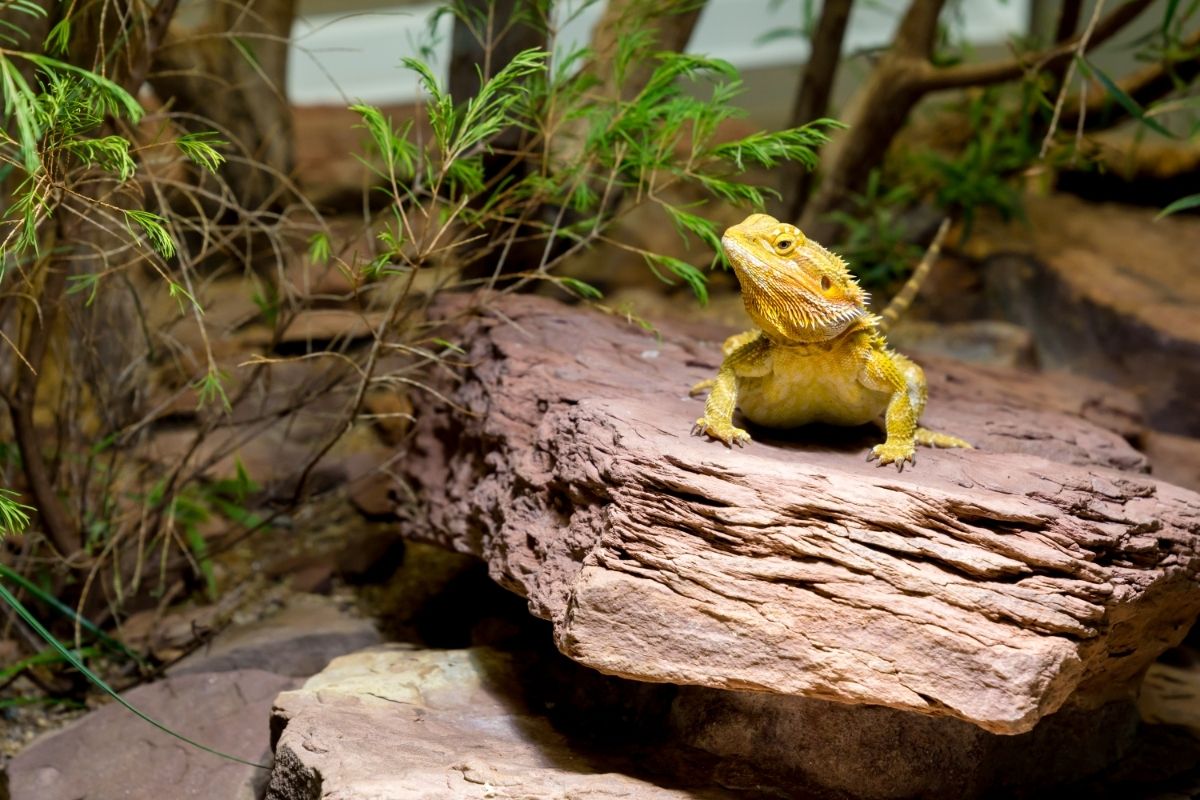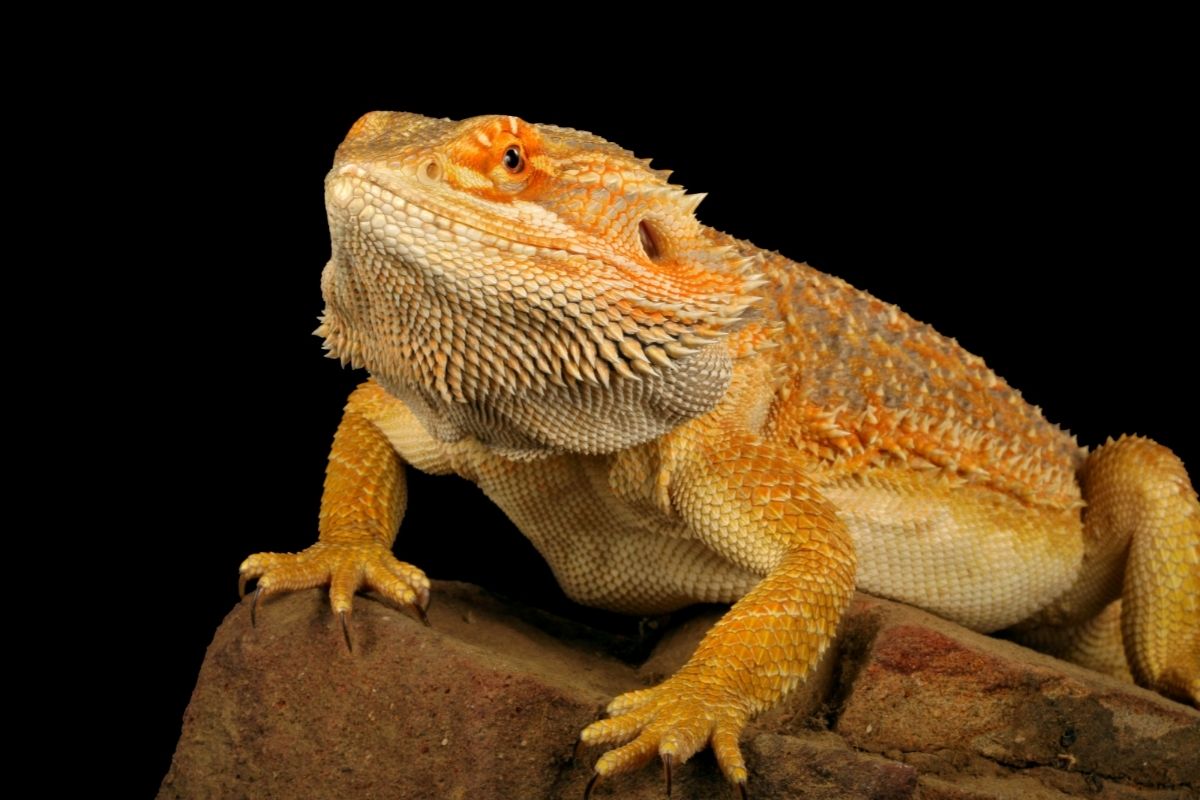Bearded dragons are reptiles native to Australia. They are also known as monitor lizards or dragon lizards. These reptiles are very friendly animals, and they love to play around.
If you want to get a pet lizard, then bearded dragons are a perfect choice. Bearded dragons are omnivores, and they feed on insects, fruit, vegetables, meat, eggs, and even other reptiles.
They are herbivorous, and they don’t eat plants. They can survive without food for several days.

Can Bearded Dragons Eat Onions?
Onions are toxic to bearded dragons. This means that they should never be fed to them. Onions contain thiosulfinates, which are poisonous compounds.
The toxins cause severe damage to the liver and kidneys. Your bearded dragon will not only lose appetite but may also become ill.
It is recommended that you do not give onions to your bearded dragon. You should remove the onion from the cage so that your reptile does not have access to this dangerous vegetable.
Onions are simply too toxic for bearded dragons and their digestive system. Bearded dragons are omnivorous, and they need protein-rich foods to grow properly.
Onion is an excellent source of protein, but it doesn’t provide enough vitamins and minerals.
Therefore, you shouldn’t feed onions to your bearded dragon because it won’t benefit from these nutrients, plus it may make your pet ill.
Bearded Dragons have a unique diet. Their diet consists of fruits, vegetables, insects, and small mammals. They also like to eat some types of fish and amphibians.
However, they cannot digest bones or shellfish. They prefer live prey to dead ones.
Their diet includes many kinds of insects, such as crickets, grasshoppers, cockroaches, beetles, and ants. They also enjoy eating worms, grubs, caterpillars, and snails.
You might wonder why bearded dragons eat insects. Well, there are two reasons for this:
firstly, insects are nutritious; secondly, they are easy to catch. Insects are low in fat and high in protein.
They are also packed with essential vitamins and minerals. Insects are also rich in calcium, iron, phosphorus, zinc, and magnesium.
Why Do Bearded Dragons Feed Onions To Their Pets?
Bearded dragons are omnivore reptiles, and they feed on many types of foods. Because onions are so common in many cultures and dishes,
it is a common belief that because they are good for humans, they are also good for reptiles.
While this idea is usually true, one of the few exceptions is onions.
The reason people think that onions are healthy for reptiles is that they are used in recipes.
For example, you might see a recipe where you cook bacon with onions.
However, you must remember that onions are extremely toxic to reptiles.
The Nutritional Value Of Onions
Onion contains vitamin C, potassium, phosphorus, iron, magnesium, sodium, calcium, copper, manganese, zinc, selenium, and riboflavin.
All of these elements are essential for proper growth and development. Some of these nutrients are important for the health of bearded dragons.
Vitamin C helps keep their skin healthy and strong. Potassium is necessary for muscle contraction and nerve function.
Phosphorus is needed for bone formation and metabolism. Iron is vital for blood production.
Magnesium is essential for normal heart rhythm and muscle contractions.
Although these are essential vitamins for Bearded Dragons, they should not be fed through onions but other foods such as fruits, vegetables, and meats. They can get all of these nutrients from other sources.
How Can I Prevent My Bearded Dragon From Eating Onions?
You should avoid giving your bearded dragon any type of onion. If you notice that your bearded dragon has eaten onions, then you should take action immediately.
Remove the onion from the cage and replace it with another safe snack.
If you want to prevent your bearded dragon from eating onions in the future, you can start by removing all the onions from its diet.

Once you have removed all the onions, you should continue feeding your bearded dragon a balanced diet.
This way, your bearded dragon will get all the nutrients that it needs, and it will stay healthy.
What If My Bearded Dragon Accidentally Eats Onion?
In rare cases, if your bearded dragon eats onions accidentally, it could suffer from some serious consequences. First, your bearded dragon will likely experience vomiting and diarrhea.
These symptoms are caused by the high levels of sulfites found in onions.
The next time your bearded dragon eats onions, you should immediately remove them from the cage.
You should also call your veterinarian or reptile breeder. They can help your bearded dragon recover quickly.
Other Vegetables You Should Not Feed Your Bearded Dragon
Vegetables like carrots, tomatoes, peppers, cucumbers, lettuce, celery, broccoli, cauliflower, spinach, eggplant, green beans, peas, zucchini, potatoes, sweet potatoes,
mushrooms, and corn are all considered poisonous to reptiles. It is best to avoid feeding these vegetables to your bearded dragon.
If you do decide to give your bearded dragon one of these vegetables, you should make sure that you only give it small amounts at first. This way, your bearded dragon won’t become sick.
Beardie’s Tips:
- Do not feed your bearded dragon raw food.
- Make sure that you don’t leave any onions lying around.
- When you’re ready to change out his food, make sure that he gets a new bowl every day.
- Never use an empty plastic baggie when changing out his food.
- Always wash your hands before handling your bearded dragon.
- Keep your bearded dragon’s water clean.
- Clean your bearded dragon regularly.
- Don’t let him play in areas where there are leaves or grass.
- Give your bearded dragon plenty of space to move around.
Conclusion
Onion is a common ingredient used in many types of recipes. However, this vegetable isn’t suitable for bearded dragons. It may even cause harm to your bearded dragon.
If you see your bearded dragon eating onions, please contact your vet right away.
Bearded Dragons can eat many types of fruit and vegetables that are safe for them, including apples, bananas, avocados, cabbage, carrots, celery, chives, garlic, grapes, lemons, limes, melons, etc.
Onions in your pet’s diet should be avoided at all costs; there are many other ways to incorporate the nutritional properties of onions into your beardie’s diet
without having to feed them onions. Onions are incredibly toxic to this animal.
With this article, we hope that you learned more about what foods are good for bearded dragons and which ones aren’t. Please share with us how you keep your bearded dragon happy!
Frequently Asked Questions
How Much Does A Bearded Dragon Need To Eat Per Day?
A bearded dragon needs approximately 1/4 cup of dry food per pound of body weight each week. For example, a 10-pound bearded dragon would require 500 grams (about 2 cups) of food per week.
What Kind Of Food Should I Buy For My Bearded Dragon?
There are three main categories of food available on the market today: commercial diets, homemade diets, and natural diets.
Commercial diets are formulated specifically for bearded dragons and contain ingredients such as fish meals, meat meals, vitamins, minerals, and protein sources.
Homemade diets are made up of ingredients such as fruits, veggies, and grains.
Natural diets are based on fresh, whole foods such as fruits, veggies, and meats.
What Should I Look For When Buying Food For My Bearded Dragon?
The most important thing to look for when choosing food for your bearded dragon is quality.
Look for high-quality brands that have been tested by veterinarians and scientists to ensure that they meet the standards set forth by the Association of Reptile Veterinarians.
Also, decide on a brand that has been proven to work well with bearded dragons.
Is It Okay To Give My Bearded Dragon Table Scraps?
It’s best not to give your bearded dragon table scraps because these items can become dangerous if ingested.
Table scraps include bones, gristle, skin, fat, blood, hair, feathers, and organs.
These items can cause serious health problems if eaten by your bearded dragon.
Can I Use Baby Food For My Bearded Dragon’s Diet?
No. Baby food is too rich in nutrients and calories for bearded dragons. This type of food will make your bearded dragon gain weight quickly. Instead, try using canned dog food or cat food.
